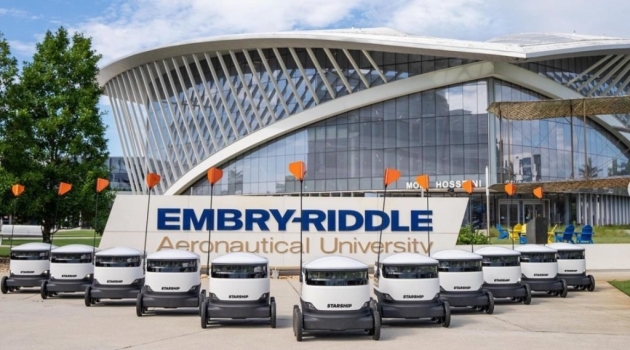With a bit of exaggeration, it’s hard to find one on a US campus that doesn’t have one of the emerging vending machine solutions available.
Starship Technologies, with its Estonian roots, has been fully involved in the installation of its small vehicles. The company just launched its futuristic food delivery service in four new branches in the past few months. Coverage was recently expanded to South Dakota State University, where 30 six-wheelers were in service.
perfect star location
Even in 2019, we also reported on one of the company’s first higher education collaborations. And the two years since then have been fitting for expansion in every way. This is due, on the one hand, to the fact that this partnership has proven to be beneficial for all parties involved, and on the other hand, it is certainly worth mentioning the Coronavirus. Because of the latter, the possibility of group and contact-free meals has increased in value.
The form is very simple. Students and teachers can order food and beverages from service providers connected to the program using the mobile application available on both large systems, and small vehicles that can handle up to 10 pounds of merchandise will deliver the package to the designated designated location. The robot’s path can be traced directly, and when it arrives, the latch must also be released with the app.
The service is not free: there is usually a convenience fee of $2 per order, which can be paid with card or local currency. Paying this extra cost is clearly not a problem for students who are always in a hurry (or even lazy).
But the institutions are also doing well, as the level of service on a particular campus expands literally for free using technology that is sure to improve the university’s edge over the competition for students.
Excellent for playground
However, it is no coincidence that Starship Technologies and other startups are also teeming with educational institutions there. These small towns, located in a well-defined area and isolated from traditional road traffic, are ideal for testing and refining existing technology. Additionally, the rules applicable to public spaces set up against stand-alone devices do not or do not apply in the same way on campus.
Local cooperation that proves effective can be transferred to the authorities in order for the authorities to make changes to the rules over time to facilitate wider implementation. It seems accidental, but the fact that future generations can get used to using such technologies without any problems is also not irrelevant. Upon leaving university, young people can express their expectations about the corporate environment or government organizations.












































